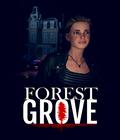Forest Grove is set in the not-so-distant future. Due to changes in laws, police are no longer able to access crime scenes or private surveillance. As you can imagine, that makes it difficult to solve crimes. That is where the RFB (Remote Forensics Bureau) comes in. Using its advanced holotech, the RFB can re-create every element of a crime scene and scour it for clues without technically "touching" anything. How does it work? Nanotechnology! Based on our preview build, it seems like an excuse for a concept, but it is a pretty cool concept.
You're rather limited in what you can do in Forest Grove. The preview build has you investigating the house of a teenage heiress of a massive tech giant. Said heiress has gone missing under mysterious circumstances, and it's up to you to figure out why. Her house has been re-created down to the smallest detail, and you can walk around with your nano-avatar and swarms of little drones.
The tech aspect doesn't change a ton about the gameplay, but it's a neat setting piece. Since you are effectively a mobile crime lab, you can perform analysis on the spot. You can scour various items to pick up traces of DNA or fingerprints, which can later be used to connect an item to a specific character; it's handy for figuring out who was holding the murder weapon. Even the most mundane items might hold the clue you need to connect characters.
Outside of that, things get a little more wild. You can also use trace evidence to re-create crime scenes or reconstruct bits of audio. These can happen on the spot or involve using a special drone to position a silhouette in the right place to reconstruct the scene. This part to be honest feels a bit more like magic than super tech but you can't really complain. It's a cool concept and it feels neat as you go through the house, gradually placing markers that show where the crimes started and finished.
Of course, it wouldn't be a good puzzle game without some standard puzzles to solve. There are lots of mundane clues to be found around the environment to help you discover hidden areas or items. Playing a certain song on the piano might open a secret door, or figuring out the title of a book can unlock someone's smart phone. (Even in the 2070s, people still have terrible password security.) This is one of the more engaging parts of the game, as it rewards you for finding clues and paying attention to small details.
Ultimately, you need to make accusations based on the available evidence. You have a handy dandy evidence board that you can access at the touch of a button. This board shows every item you've found and any forensic evidence connected to it. If you can identify a DNA sample, it shows all items with the same sample, and if you know that one item connects to another, that information will also be listed. It doesn't quite tell you what the correct answer is, but it allows you to piece together clues to find a solution.
Overall, Forest Grove feels like a neat concept for a detective game. By framing it almost entirely around trace evidence and long-distance analysis, you end up with an almost surreal game where you slowly piece together clues from the smallest samples instead of finding a single case-breaking clue. The preview build gave us a lot to be excited about, and the final game looks to offer even more in terms of mystery-solving fun. We're looking forward to checking out Forest Grove when it comes out later this year.
More articles about Forest Grove













 Forest Grove is a sci-fi crime mystery puzzler where you enter the scene of the crime as a Remote Forensic Investigator and crack open the case of the missing teenage heiress.
Forest Grove is a sci-fi crime mystery puzzler where you enter the scene of the crime as a Remote Forensic Investigator and crack open the case of the missing teenage heiress.









